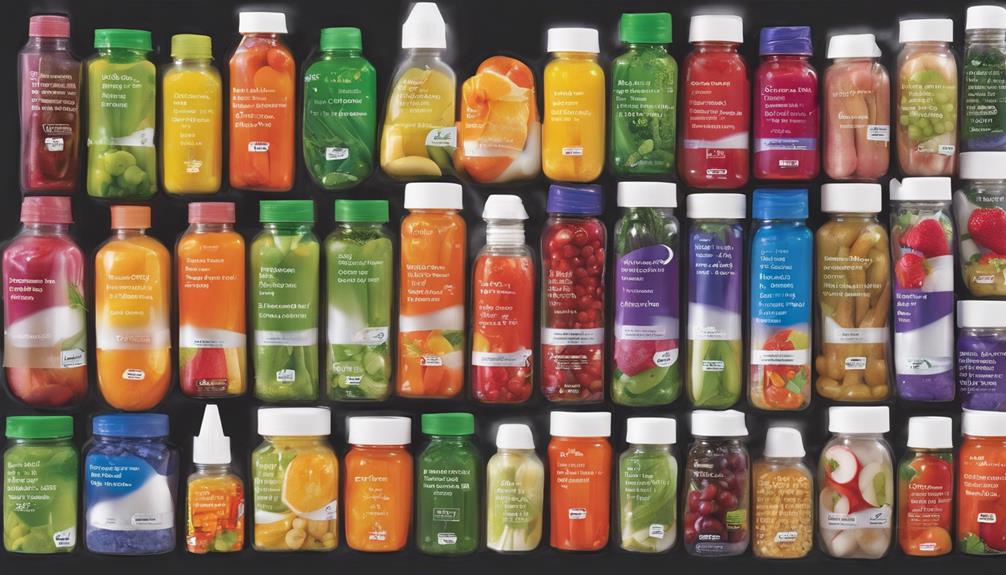As parents, we prioritize our children’s health above all else. Did you know that formula feeding could potentially impact the development of their immune system?
This is just one of the many factors to take into account when deciding between breastfeeding and formula feeding. Let's explore five cons of formula feeding that every parent should be aware of, shedding light on important aspects that are often overlooked in this ongoing debate.
Key Takeaways
- Formula-fed babies miss vital immune-boosting antibodies, leading to weaker immune responses.
- Formula feeding poses financial burdens with costs up to $1,500 annually.
- Formula feeding may hinder bonding and emotional connections between parent and baby.
- Formula-fed infants are at higher risk of various health issues like respiratory infections and allergies.
Lack of Immune System Benefits
Unfortunately, formula-fed babies miss out on the essential immune-boosting antibodies and enzymes present in breast milk, leading to potential consequences for their immune system development. Breast milk contains a myriad of protective factors that help bolster an infant's immune system, providing a shield against various infections and illnesses. The antibodies in breast milk, such as secretory IgA, actively combat pathogens in the baby's digestive tract, respiratory system, and beyond, reducing the likelihood of respiratory infections and gastrointestinal issues. Additionally, the enzymes present in breast milk play a vital role in aiding the baby's digestion and absorption of nutrients, contributing to overall health.
Research indicates that formula-fed infants may experience a weaker immune response compared to those who are breastfed, making them more vulnerable to infections. Furthermore, breast milk helps establish a healthy gut microbiome, which is essential for proper immune function. The absence of these immune-boosting components in infant formula can have implications for the long-term health of formula-fed babies, emphasizing the unparalleled benefits of breast milk in fortifying the immune system during infancy.
Potential Digestive Issues

Formula feeding can occasionally result in digestive issues for infants, including constipation or gas, attributed to variations in digestion compared to breast milk. Some babies may experience stomach discomfort, reflux, or irregular bowel movements when fed with certain types of formula. Inconsistencies in formula preparation or changes in formula brands can also disrupt the baby's digestive system, leading to potential issues. Colic, characterized by excessive crying and discomfort, is more prevalent among formula-fed babies and is often associated with digestive challenges. Changes in stool consistency, such as firmer stools, can also indicate digestive issues in formula-fed infants. Below is a table summarizing the potential digestive issues that babies may encounter due to formula feeding:
| Digestive Issues | Description | Potential Impact |
|---|---|---|
| Constipation | Difficulty passing stools, leading to discomfort and irregular bowel movements | Disrupts baby's routine |
| Gas | Build-up of air in the digestive tract, causing bloating and discomfort | Excessive crying |
| Reflux | Regurgitation of stomach contents, often accompanied by fussiness | Disrupted sleep patterns |
Cost Considerations and Financial Impact
Considering the financial implications of formula feeding is essential for families planning their budget and expenses. Formula feeding can cost parents an average of $1,200 to $1,500 in the first year, creating a significant financial impact compared to breastfeeding.
Ongoing expenses such as specialized formulas, which can be more costly, need to be factored into the budget. The continuous need for formula purchases can lead to higher overall expenses compared to breastfeeding.
Additionally, families must account for the cost of bottles, nipples, sterilization equipment, and formula storage solutions. Opting for formula feeding requires a long-term financial commitment and may necessitate budget adjustments. It's vital for parents to be aware of these financial considerations when deciding on formula feeding for their child's nourishment.
Difficulty in Bonding and Emotional Connection

Moving from the financial aspects of formula feeding, it's important to recognize that the method of feeding chosen can greatly impact the bond and emotional connection between a parent and their baby. Formula feeding may present challenges in establishing a strong parent-baby bond due to the lack of oxytocin release, known as the bonding hormone, which is typically more pronounced during breastfeeding. The absence of skin-to-skin contact and intimate interactions during formula feeding can also affect the emotional connection between the parent and the baby. Physical closeness and bonding experiences that naturally occur during breastfeeding may be limited with formula feeding, potentially leading to feelings of detachment or a sense of reduced emotional fulfillment for some parents. The table below highlights the key factors influencing bonding and emotional connection in formula feeding:
| Key Factors | Impact on Bonding and Emotional Connection |
|---|---|
| Oxytocin release | Reduced bonding hormone levels in formula feeding |
| Skin-to-skin contact | Limited opportunities for intimate interactions |
| Physical closeness | Less bonding experiences compared to breastfeeding |
| Emotional fulfillment | Potential sense of detachment and reduced fulfillment |
Increased Risk of Health Complications
The heightened susceptibility to health complications in infants fed with formula underscores the importance of understanding the potential risks associated with this feeding method.
Formula-fed babies are at a greater risk of developing respiratory infections, gastrointestinal issues, and allergies. Studies indicate that formula feeding is linked to a higher likelihood of childhood obesity and chronic conditions like asthma and diabetes.
Additionally, formula feeding may result in lower immunity levels in babies, making them more prone to illnesses and infections. Infants fed with formula also face an increased risk of Sudden Infant Death Syndrome (SIDS) compared to breastfed babies.
Moreover, formula feeding can lead to missed opportunities for the transfer of essential antibodies and immune-boosting factors present in breast milk, which are critical for the baby's overall health and well-being.
It's important for parents to be aware of these potential health complications associated with formula feeding to make informed decisions regarding their child's nutrition.
Frequently Asked Questions
What Are the Negatives of Formula Feeding?
Aware that formula feeding lacks the antibodies and emotional bond of breastfeeding. It can cost $1,200-$1,500 yearly, may increase illness risk, and miss immune-boosting properties. Remember these factors when deciding how to nourish your baby.
What Are 2 Issues With Formula Feeding?
Two issues with formula feeding include increased risk of infections in infants and ongoing financial burden for parents. These cons may outweigh the convenience of formula feeding, impacting both the baby's health and the family's budget.
What Are the Cons of Supplementing With Formula?
When supplementing with formula, drawbacks include potential reduction in exclusive breastfeeding benefits, hindering milk supply establishment, causing nipple confusion, incurring higher costs over time, and lacking immune-boosting advantages. Parents should weigh these cons carefully when considering formula.
What Are the Cons of Ready to Feed Formula?
Ready to feed formula can be pricier and heavier to carry. Some brands might be hard to find. Babies may not like the taste. Once opened, it must be used quickly. These factors make ready to feed formula less convenient.
Conclusion
To sum up, it's important for parents to weigh the cons of formula feeding against the benefits of breastfeeding. While formula feeding may seem like a convenient option, it lacks the immune system benefits, may lead to digestive issues, can be costly, and may impact bonding and health outcomes.
Let's not sugarcoat it – the decision to formula feed comes with its fair share of challenges. So, let's make an informed choice that prioritizes the health and well-being of our little ones.










